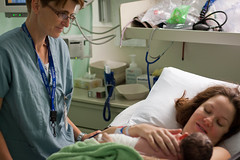
Photo by Nick Van Snellenberg
Doulas and childbirth educators often talk about having a trust in women. In prenatal classes and doula visits, we encourage women to trust their intuition, trust they and their bodies know how to birth their children, trust they will intuitively do the “right” things during labour and birth. But do we always trust them? Or do we sometimes hope for them to trust in us, and our personal, passionate and well-intentioned birth philosophies?
In an earlier post, I talked about my day-job career in mainstream health care. It’s career that I had previously never felt particularly suited to, riddled with what I perceive to be driven by pharmaceutical company financial interests and a philosophy about health that is not necessarily in line with my own.
I have no shortage of things to say about the politics of childbirth and the way birth options are delivered to women in the medical world: medical care is fear-driven, doctors are not taught to trust women’s bodies when it comes to birth, doctors and OBs can be prone to encouraging interventions and medications at every turn, etc. These statements are often true, and I would personally like to see a shift in the perspective, language and protocols for birth in the medical world.
However, some of my best friends and closest colleagues are pharmacists and doctors, and I also respect the health care services they provide. From technologically advanced options for childbirth in hospitals to providing medications for treating infections or increasing milk supply, there is a lot that allopathic medicine has to offer women.
Key word: offer. If we really trust women, should we be scared that they will take the medical world up on their “offers” of medical care when it may not be the right choice for them?
Our birth culture, in my opinion, requires a change. I struggle with the way these offerings of medical intervention are often presented to women, with the tendency to teach women that birth is scary and painful and that their bodies are not capable of giving birth without medical help. There is also a tendency to play down the side-effects of medical intervention in birth. This culture is the product of a long human history. I find the anthropology and politics of birth fascinating and important, and I deeply desire to create a shift in the current culture that has been created around birth. But I also believe we have to work with what we’ve got in this moment.
In this moment, a lot of women fear birth. And a lot of women do not want to experience the intensity of labour and birth. Trusting women to make the right birth choices for them, their bodies, and their babies means trusting that if they take up offers of medical models of birth care, medical birth is their right choice. My hope is that they make these decisions based on a true understanding of their options and the issues surrounding them.
I would like more women to know that birth is not inherently scary, painful or dangerous. I would like to see medical care chosen more often as a solution to maternal health problems rather than as a method for managing healthy pregnancies and birth. I would like women to know that they don’t need medications or hospitals to give birth any more than they need medications or hospitals to menstruate safely once a month. However, I will always support a woman’s decision to request pain medication when she doesn’t feel mentally or physically prepared for coping with the intensity of childbirth, or her choice to select a more medical model of birth over a more “natural” approach.
I believe doulas DO trust women. Just like with anything, there are people on both ends of the birth extreme. There are medical-birth advocates who think “natural childbirth” puts women at risk and makes them suffer unnecessary pain. And there are natural birth advocates who think “no interventions at all cost”. But in the community of midwives and doulas I interact with, most of us understand that birth choices are up to the expecting mother and no one else. Our goal is to contribute to women feeling confident and informed, helping them to speak with strong voices to create the birth experience they desire.
Let’s trust birth. Let’s trust women. Let’s build a culture of knowledge, support and confidence in birth. Let’s help women have positive births, whatever that means for them.
